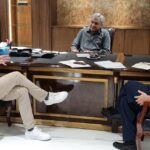By Dr Saeed Ahmad Ali
LAHORE, Sep 05 (APP): Sun Tzu, an ancient Chinese general, military strategist, philosopher, writer and author of the noted book ‘The Art of War,’ had said “The greatest victory is that which requires no battle.”
Founder of Pakistan, Quaid-i-Azam Muhammad Ali Jinnah in his ‘broadcast’ speech to the people of USA in February, 1948 had said that “Our foreign policy is one of friendliness and goodwill among all the nations of the world. We do not cherish aggressive designs against any country or nation.”
Since India and Pakistan won their independence from Britain in August 1947, under the partition plan, which was submitted by the Indian independence Act, provided that Kashmiris would be free in deciding their fate whether to accede Kashmir to India or Pakistan.Initially the ruler of Kashmir, Maharaja Hari Singh decided to declare Kashmir a separate independent state, but in October 1947, it suddenly announced to join India, following which tribesmen from Pakistan reached there to help their Kashmiri brethren.
The situation turned intense and a war between India and Pakistan erupted and India approached the United Nations(UN) to intervene in the situation. The UN while taking the cognizance of the situation recommended to hold a plebiscite to settle the problem.Instead of holding the plebiscite, on the early morning of 6th September 1965, Indian troops crossed into the Pakistan territory in the Burki Sector near Lahore , Indians had been assured by their army commanders that they would be having their breakfast in Lahore.
An American Radio Service Journalist Rai Milan who witnessed the 1965 war, and served the region for two decades, has dispelled in his written published-diary report that the Indian claims of their victory in war were bogus saying” On ground, there was no evidence to support Indian claims.
“However what I see was only destroyed Indian tanks and huge logistic support units rolling towards their forward area.” he writes.Rai further says that during his two decades journalistic career, he had never seen such brave, victorious and confident fighting soldiers as Pakistan army soldiers, during this war against Indian troops”.Giving the analysis of the Indo-Pakistan 1965 war, he further writes that the Indian military commander’s planning and invasion of Pakistan was a strategic blunder.
The Indian Army failed to analyse the real potential of Pakistan Army which resulted in their defeat.An official long-suppressed document drafted by the Indian Ministry in 1992 reveals that the top Indian military commanders, their intelligence had committed strategic blunders by attacking Pakistan.Likewise, there are hundreds of other blunders by the Indian Intelligence and their field commanders.
Talking to APP noted defence analyst Lt General (R) Naeem Khalid Lodhi said that during the seventeen-day 1965 war, Pakistan Army, with the high morale backing of the the entire nation, stood like an iron wall against Indian onslaught on all fronts.
Pakistan Army in next few days, taught Indian Army to never take Pakistani nation’s spirit lightly next time, he said.Naeem Khalid Lodhi said that on the Sialkot front, one Indian Infantry, one armoured division and an armoured brigade were repulsed by a single infantry division of Pakistan.
On Chawinda-Philora Sector, fifteen Indian attacks were repulsed only at which is a record, he added., had been Similarly India had faced the biggest humiliations of the war on the Lahore front, where thirteen of its attacks were completely repulsed. Pakistani forces at Kasur front not only repulsed multiple Indian attacks, but also went deep into India and captured a substantial part of their territory, he added.
He said that displaying unanimous spirit, Pakistan army and nation faced the Indian troops boldly and defeated them on all fronts, adding that there had been rare examples of such extreme valour and courage in the global military history, which the Pakistani nation and our soldiers showcased in the 1965 war.
Despite numerical superiority, the Indians were humiliated on all fronts at sea, air and ground, he added.Describing the Pakistan Air Force(PAF) complete victory over Indian air force during the war, Lt General (R) Naeem Khalid Lodhi said that Muhammad Mahmood Alam (MM Alam), a Pakistan Air Force (PAF) fighter pilot had the credit of downing five Indian Air Force aircraft in less than one minute.MM Alam, nicknamed as ‘Little Dragon’ popularly, made unforgettable history by knocking down nine Indian Fighter Jets ‘Hawker Hunters’ in air to air combat, he added. Similarly Pakistan Navy on September 8, 1965, Pakistan Navy warships including its submarine Ghazi raided on Dwarka and bottled up the entire Indian Navy fleet, which are the glorious reminiscences of the war, Lodhi told.
Sardar Ahmed Bhatti (95 years old now), the younger brother of a great son of the motherland, Major Aziz Bhatti Shaheed (NH), told APP that on 6 September 1965, Aziz Bhatti as Company Commander, in the Burki area of the Lahore sector had moved with his forward platoon under incessant artillery and tank attacks.He confronted a huge enemy for five days and nights in the defence of the strategic Bambanwala-Ravi-Bedian Canal (BRB) canal, he said.
Ahmed Bhatti said that undaunted by constant fire from enemy’s tanks and artillery, Aziz Bhatti organised the defence of the canal. Aziz had directed his men to answer the fire until he was hit by an enemy tank shell.Aziz Bhatti stopped the enemy with his bravery and embraced martyrdom on September 12, 1965.
The seventeen day war continued with full resolve and determination in the ranks and files of the Pakistani Armed Forces.The brave forces proved once and forever that the valiant Pakistani soldiers backed by a resolute nation were not to be cowed by Indian threats and intimidations.




